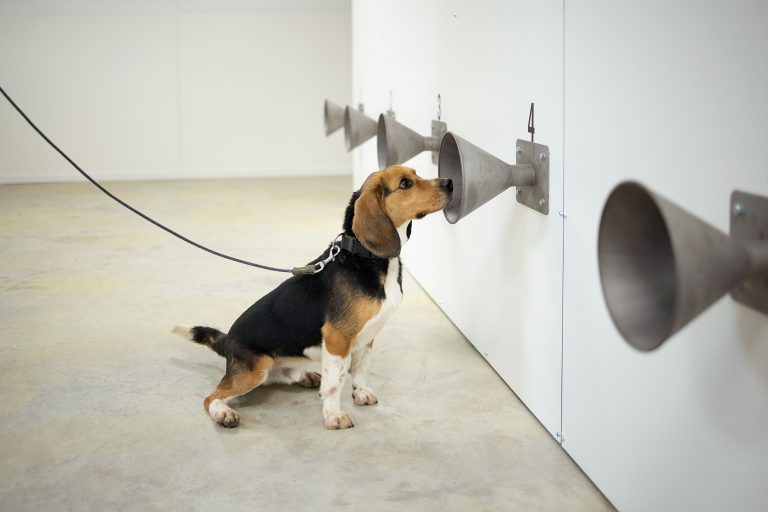In a new study published on June 1, it was reported that canines are better at detecting COVID-19 than some rapid antigen tests under certain circumstances.
The research, coupled with similar studies, suggests that our canine companions are able to detect the virus, however there are some factors that are calling the findings into doubt.
Sniffing out the results
According to the 2021 study published by Plos One, the dogs used for the test were able to accurately locate 97 percent of positive cases from sweat samples leading researchers to conclude that canine detection can be “more sensitive than some rapid antigen tests.”
The dogs proved so successful that the researchers believe that they can detect asymptomatic infections as well “with a sensitivity nearing 100 percent.”
The dogs sniffed human sweat samples collected from community centers from across Paris, France. The samples were taken from a myriad of symptomatic and asymptomatic individuals.
Success
You are now signed up for our newsletter
Success
Check your email to complete sign up
From there, five dogs were trained to look for a positive COVID-19 sample. They were rewarded with toys if they successfully detected a case. Out of the 335 samples, 109 of them were positive on PCR lab tests.
Each sample was placed in a tiny box behind a cone. These cones were placed in rows of 10, allowing the dogs to seek out the positive cases. Upon finding one, the dog would sit down.
According to the author of the study, Dominique Grandjean, the dogs took just 15 seconds to find 20 COVID-19 samples. Despite a slightly less accurate assessment of negative samples, the dogs were able to find 91 percent of the samples that were “Covid-free”, meaning some were “false positives.”
Grandjean said that dogs “only need a few molecules” to find and determine a positive case.
He believes that his research proves that dogs can be helpful in finding COVID-19 in airports, nursing homes, schools and even sports events. In fact, dogs are already being used to detect positive cases at airports in Saudi Arabia, Finland and the United Arab Emirates.
Grandjean — along with the director of the Penn Vet Working Dog Center at the University of Pennsylvania, Dr. Cynthia Otto — also believes that dogs could have the ability to detect infections earlier than PCR tests, even determining a positive case from a previously negative one.
In the study, the dogs were searching for the “original coronavirus,” but now, Grandjean is studying how well dogs can seek out other variants of COVID-19.
Previous tests have also tapped into the poignant senses of dogs in detecting COVID-19 and other diseases. In Florida last year, dogs were found to have predicted positive tests “with 73 to 93 percent accuracy.” A study in the UK also saw dogs predicting “82 to 94 percent” of positive cases.
Grandjean also previously studied a dogs’ ability to sniff out colon cancer, and detecting COVID-19 in a person’s mask.
READ MORE:
- 4 Animals With Superhuman Powers
- Does Your Dog Possess the Sixth Sense?
- Dogs’ Emotions Can Be Read in Their Eyes
Reliable scouts?
However, Otto did express that it is difficult to train dogs to scout out COVID-19.
“The ideal — and I would consider it the Holy Grail — is that the dog is just standing there, a person walks by, and they say, ‘Yes, no, yes, no, yes, no,’” she said. “That eventually could be done, but making sure it’s done with all the proper controls and quality assurances and safety — it’s a big step. I haven’t seen anyone who has proposed how to make that transition in a way that’s scientific and safe.”
In addition to the difficulty of training, Otto also said that outside odors could also obstruct the dogs’ senses.
Grandjean said, dogs have the Jacobson’s organ; an organ in their noses used to pick out smells that we can’t. While COVID-19 can be sensed, other compounds found in the air, saliva or sweat may get in the way.
Also, even if treats can be used to incentivize them, not all dogs will like the same one.
“For some dogs, a ball might be the absolute best thing in the world, where another dog might think that a tug toy or a squeaky rabbit is the best thing,” Otto said.
Moreover, Otto believes that dogs may not be able to detect COVID-19 when facing a real human, as opposed to “a sweat sample or piece of clothing.”
“That’s one of the big challenges — to have the dog learn to translate from a sample to an entire human being, which is a much more complex odor,” Otto added.
Regardless of the difficulties, Otto still affirmed that dogs could still be “a useful prescreening tool” to locate possible cases for lab inspections. However, she still advised against anyone willing to train their own pets.
“Don’t try this at home,” he said.
















